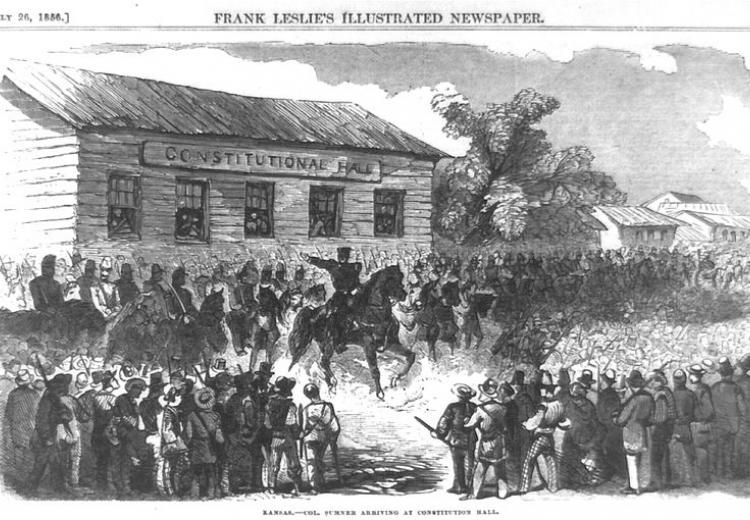Lesson 3: The Kansas–Nebraska Act of 1854: Popular Sovereignty and the Political Polarization over Slavery

Colonel Sumner dispersing the people assembled before Constitution Hall in Topeka, Kansas.
"It will triumph & impart peace to the country & stability to the Union." So predicted Illinois Senator Stephen A. Douglas regarding the policy of local "popular sovereignty." Popular sovereignty allowed the settlers of a federal territory to decide the slavery question without interference from Congress. Stephen Douglas included this policy in a bill organizing the northern section of the Louisiana Purchase once known as the Nebraska Territory but now divided into two separate territories called Kansas and Nebraska. By removing the question of slavery's expansion from federal lawmakers, and placing it before the settlers immediately affected by it, Douglas thought he could preserve the American union by avoiding a federal dispute between northern abolitionists and southern "ultras."
This lesson plan will examine how the Kansas-Nebraska Act of 1854 affected the political balance between free and slave states and explore how its author, Stephen Douglas, promoted its policy of popular sovereignty in an effort to avoid a national crisis over slavery in the federal territories. This lesson will also consider Abraham Lincoln's counter-argument that both the Declaration of Independence and Constitution committed the national government to extending freedom, not slavery.
Guiding Questions
To what extent did the Kansas–Nebraska Act of 1854 resolve the conflict over slave and free states?
How could congressional neutrality towards slavery in the federal territories actually stir up sectional strife?
Learning Objectives
Analyze maps and other graphics to draw conclusions about the influence of demographic and geographic changes on the debate over free and slaves states.
Analyze the arguments made by Stephen Douglas regarding popular sovereignty and predict the consequences of his proposed solutions.
Analyze Abraham Lincoln's position regarding the Kansas-Nebraska Act and popular sovereignty.
Evaluate the potential outcomes of Lincoln's self-government and Douglas's popular sovereignty.
